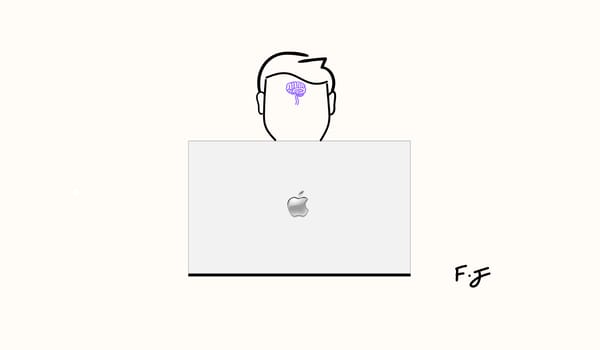
Do you think that throughout time, people have always forgotten each other’s names within minutes of meeting one another? Or just us?
Before our smartphones had calculators, did people flinch at doing basic calculations on pen and paper, possibly even in their heads?
I have a love-hate relationship with productivity tools that rob us of our capacity to experience deep, creative thinking.
On one hand, these ingenious hacks save us time and effort, making us feel smarter for adopting new ways to get things done quicker.
The other part of me feels like my brain is beginning to atrophy with all these shortcuts.
What use is my brain if we’re outsourcing all the work?
Where’s the fun in that?
Tools Rob Us From Deep Thinking

Eight years ago, I was gearing up to apply for medical school.
In order to attain some work experience in a healthcare setting, it was widely recommended that we spend some time volunteering in a care home for the elderly, so that’s exactly what I did.
When I’d visit, I’d spend a fair share of time next to two inseparable residents who could be reliably found discussing puzzles or conversing about various topics, a lady and gentleman in their 80s no relation.
One particular Sunday afternoon (the day on which I’d visit), the gentleman asked me to tally up approximately ten numbers he’d written down at the back of a magazine.
I can’t quite remember what those numbers were for, but I’m pretty certain he was just trying to observe how quickly I’d be able to perform the calculation.
To his surprise, I whipped out my phone and loaded the calculator app. Take that, boomer!
He stopped me: “Why do you need that for!? Use this”. He slowly raised his arm and prodded my temple twice as if to say:
“USE YOUR BRAIN!”
He was right.
You know how your brain magically takes a snapshot of where you were and what you were doing when you experience a heightened emotion?
Well, I remember that moment because he made me feel like a complete idiot.
I was fully capable of doing those calculations using my brain alone.
Was it smart of me to find a quicker, easier alternative to performing the calculation?
Or, was I rendering the mathematical capabilities of my brain useless by outsourcing the task?
Use it or Lose it

The brain isn’t a muscle. But in some ways, you can think of it like one.
If you’re not actively strengthening it or maintaining its capabilities, the net effect is that you begin to weaken or even lose them.
The concept of Hebbian plasticity (or Hebbian neural connections) suggests that the formation and elimination of synapses (a site of transmission between neurons) are dependent on activity.
“In general, input neurons converging on dendrites differ in synaptic activity, resulting in more active inputs outcompeting less active inputs for dendrite connection. Inputs with less active synaptic regions are ultimately eliminated”Kenneth D. Miller, 1996
I’m not going to delve into neuroscientific details as it isn’t my field of work, but in layman’s terms, it’s generally accepted that in some cases of learning and memory, the following can be deemed true:
“Use it or Lose it”
We Don’t Think Like We Used To

As a doctor working in the NHS, I live a double life.
At home, I’ve got a laptop that loads in seconds, Evernote to instantly retrieve any note I’m looking for and Grammarly to drastically reduce my proofreading time.
At the hospital, I stare at the computer screen as it takes its sweet time to load, open 4 different applications to see all my patient’s investigation results and then manually search through heaps of paper notes to piece together the remaining clinical picture.
At home I’m a productivity guru, at work I’m a cave man.
The sheer contrast in productivity levels between these two environments really made me think about how I use my brain differently in both scenarios.
At home, every problem I face is usually just a google search away. If my effort can be reduced through productivity apps, I search for a tool that provides a solution. If I want to recall something later, I jot it down using a note-taking app so that my brain doesn’t have to.
At work, the challenges we face can’t be solved with a simple google search and the tools available are slower than we can bear to wait for. The result is that we’re left to our wits, nothing but good, hard thinking.
Don’t get me wrong, I’m a big fan of technology when it saves us time and energy that would otherwise be spent on menial tasks and laboured thinking.
We’ve created amazing tools to make the boring stuff easier so that we can focus on the fun, important stuff.
The problem is, we’re at the point where we’re using tools to literally automate everything. My autocorrect even tried to finish off this sentence, can you let me think!?
When I first started working as a doctor, my senior colleagues could recall names, conditions and investigation results of several patients having just reviewed the information a single time.
Me? I’d forget my patient’s name 30 seconds after I asked them for it. Were they superhuman?
The upside of working in a not-so-tech-savvy NHS is that I get to experience beautiful moments of brilliant thinking with my peers (Matt Hancock, please still send us money).
Without automated systems to detect medication clashes, we use our brains. With no reliable way to search through electronic scans of hand-written notes, we scan through pages upon pages, piecing together a mental jigsaw.
Over the course of 10 months, noticeable differences in my short and long-term memory, lateral thinking and problem-solving capabilities have given me a newfound love for making full use of my brain.
Now, I only forget names after 30 minutes!
Takeaways

There’s no computer that can match the brilliance of our brains. Each time we train our computers to get better at a task, we rob our brains of that same opportunity.
Make good use of your productivity tools, just leave some work for your brain.A bored brain becomes an inactive brain. An inactive brain becomes a useless brain.
If you liked this article, you might like this one too: It’s time the NHS placed its staff before its patients
💌Join a growing tribe of 280+ readers interested in personal growth for FREE.
You can read all my previous articles here on Substack or on Medium.
✏️ About the Author:
👨🏽⚕️Faisal is a Junior Doctor working in the NHS, new Youtuber and Founder of YoungAcademics.
☕️If you’re feeling generous today and would like to support his content, you can buy him a coffee.
📺Watch my latest video on Youtube below - new videos (almost) every week!
